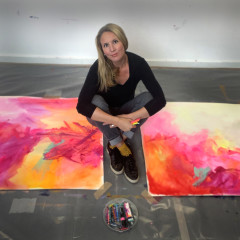Appreciation of the arts
I feel as though people have lost appreciation of the arts. Humanity has a collective responsibility to think and feel without another’s judgment, to truly evoke something unique inside of us - that is the beauty of art. Artist’s lives are painted into their works and sometimes this is mis understood.
My argument just asks for respect.
Respect doesn’t come from hard work and achievement. Neither does it come from the idealised opinion that one is worthier of respect than another. For a famous artist being known for their works due to the views of society placed on them, what about artist without this fame? To point the finger and decide what is and isn’t worthy of respect would be playing God. We aren’t capable of ranking artwork on a definitive scale, because the true meaning of art is deeper than the price it sells for. Even so, some would never make it to market.
The reason that evoked my opinion the subject was through experience of visiting a gallery and seeing all the incredible artist’s works of Vincent Van Gogh and Claude Monet. At the Musee D’orsay the disrespect was shown throughout tourist’s attraction to the fame of the artist rather than his works. The struggles he faced were by comparison to how he was treated - as a tourist attraction is disrespectful. Although, art is different for everyone and how we treat it, I still believe that artists deserve respect for what they create.
The opinion of art
Through data collection of a survey I can assess that people’s views of art are all similar is aspects. Most people view art work as a form of expression, and ill agree with that because art is a way of showing one’s feelings and emotions in any format media. Some might just take it for granted that it exists as a media for those to express their feelings while others just acknowledge its existence. People’s individual opinions of art vary across parties, I found that younger age groups don’t have as in-depth interest in the arts as the older generation. I found that the opinion of art is mainly for expression.
Respect for art
However, respect isn’t understanding, its simple recognition. Context doesn’t show understanding it’s to look at something and feel time and effort. To know someone cared about what they’d created, that emotion was put into each creation. We don’t have to like it to respect it because art evokes something unique in us all. Respect is basic, its simple it doesn’t require any effort to give. A moment of our time to admire something whether we care about it or not. A minuet of our time is nothing compared to our life time or theirs. Because is we all did it, that’s a lot of time. That’s all that artist lived for, just for someone to look their way. To fell acknowledged when you’re fighting by yourself against a world of critics.
From all of the responses from my surveys I’ve concluded that they all want to show respect for arts. No matter whether they have an interest or lifestyle around art they all feel as though respect is something that art deserves. Although, this might not always be the case because in real situations we don’t know how to properly respect art because to simply visit a venue, and my responses showed that not everyone has, that it doesn’t mean that we can respect art for what it is. It’s the mentality we have to the rights of the artist and the rights they have to be treated equally.
Individuality of art
A comparison to this argument is individuality. I’ve previously outlined we all have different perceptions of an artist’s works. A primary school teacher said that “does it matter how others feel about someone’s work, we’re all entitled to our own opinion and thoughts, all that truly matters is that someone appreciates their paintings”. She was right, even though as an artist, I felt it was wrong to treat art in this manner. To just take a photo and walk away. We all live and lead different lives. We can do what we want and view things however we chose to. Whether we miss out on the artist views and lives is up to how we view things.
This is supported with my findings that whether we attend an art venue or not it doesn’t mean that we shouldn’t disrespect art. Our individual interests do influence how we show our dedication whether we go or don’t go to famous artists or admire their works, it doesn’t mean that they don’t deserve respect, because they do. From my surveys ice discovered that visiting galleries or not or even taking an interest. Art deserves the admirations from any type, not matter our interest.
Appreciation through galleries and interests
Building upon this point, an article on science direct talks about ‘tourists’ appreciation of Maori culture in New Zealand’. It explains the ‘demands tourist require from their encounters with indigenous peoples.’ To think that the only recognition that artist gain is because they have achieved something. The that visit these galleries aren’t always there because they a fascinated by the artist or their paintings but because of the fame attached to these paintings.
Art enthusiasts might be able to know the biographies of the artists in a gallery, understand the visual elements of form and technique as well as the meaning of the subjects of the piece. This arts appreciation links to the abnormalities of the arts world and it’s good to know all the ins and outs of an artist. Although, this can’t be generalised to everyone because we can’t all be so inspired by art. Art has been subjective to us all, we all are inspired in different ways about an image, some might see it differently to another and some might not be inspired at all. Also, this knowledge isn’t always common about artist’s lives so we can all be expected to understand a painting.
From my articulations brought from my surveys I can determine that appreciation can come from personal interest, being an artistic person or teacher of the arts. Although, even if were not being artistic yet still believing that art deserves rightful respect. Some might visit artist in galleries because of their personal interest in art whether a creator or simply inspired by the artists in the exhibition. While someone on the other hand do it simply because it’s on the “bucket list of things to do in my lifetime”. Yes, trying the experience is good an all and it might help people to become inspired but to treat it as a necessity to lie without any appreciation, I feel is the wrong mentality.
Politics
During the development of time we have found that politics has influenced our arts, like in Weimar Germany there were many artists trying to rebel against the government. All wanting to create a political message. In so many ways there have been controversial artist that have rebelled more against the rules of the time, like ways of painting and what we painted. In modern day, we still have artist, especially street artist, like Banksy who wanted to present a political message through his graffiti. In one of his works he puts “if a lie is repeated enough it becomes the truth politics”.
Through my results I can conclude that nowadays we still don’t have as much of a noticeable effect of politics influence. I can personally say that though learning about Weimar Germany in history I understand some of this context of politics in art. However, it is present in the modern day. Even recently, with the issues of Brexit there is propaganda of politicians and Treasa May. So, during the past few years there has been much political influence over art and the message it conveys.
Graffiti
From the survey results I ca conclude that he majority of ideas about graffiti as a message and street art. Some also mentions that it was individual expression and vandalism but from all the respondents views they all said both of those two things. Through ideas of what makes street art and wat defines it is difficult to pin point. Some argue that it is simply vandalism and that is all, it’s up to our interpretation of what the artist is trying to present to us. Graffiti wasn’t solely based around art at first. The British council talks about where this vandalism comes from and it states “The first drawings on walls appeared in caves thousands of years ago. Later the Ancient Romans and Greeks wrote their names and protest poems on buildings. Modern graffiti seems to have appeared in Philadelphia in the early 1960s, and by the late sixties it had reached New York”. So, this shows how graffiti was even fundamental to our development as humans and through language, and in later dates as a form of rebellion as they continue to state through street gangs. More modern street art has had a political influence especially though Banksy, a famous artist that preachers and shared his views of society. The fame he’s captured is global and this scale of appreciation though these connections is incredible, it just shows that this form of expression really can bring people together.
Educational
In modern day this subjectivity tends to come from the exam boards, linking to grades being put down due to requirements of the system throw the idea of what is art into jeopardy. The grading of an artist form is irrational because you can’t properly appreciate the work put in. What is art as a subject? Can it only be judged on whether it meets exam board requirements? AQA states that ‘grade that fairly represents their attainment and reflects the skills that they have demonstrated.’ It all seems so standardised, surely art is an expressive subject and so deserves some sort of self-report from the student before finalising wat is and isn’t worthy of a good grade. The exam board looks at the books and the judges from what they’ve seen what skills are good and bad. For an artist like Jackson Pollack, is was to be graded by the system of GCSE art and designs specifications would he acquire a high grade for his works that also represents the skill of his paintings?
One size doesn’t fit all.
Although to contrast, exam boards just be ‘generalised to all students’ to keep the grading system fair, but is every student generalisable, aren’t we all unique and deserve that identification? By keeping everyone under the same grading system net we try to capture all ranges of works yet some slip through. For those that have true artistic talent yet can’t apply it to an unclear system is unfair.
Although to the public eye this isn’t projected enough. I’ve found that as an art student I’ve noticed this more than adults and our peers. From survey results I can conclude that the noticeable discrimination within art is currently prominent, yet, those without the inside knowledge don’t see the issue. Most blame this on the institution or the lack of funding for these less prestige artistic courses. There might be more interest in English and Math subjects. So perhaps there’s is a segregation between subjects for the recognition of the arts yet it’s all down to funding and understanding.
Art has also influenced our educational system in many ways. It’s evolutionally to us. Our fist form of communication and how we shared information though images. For infants, art is crucial for not only helping to evoke creativity and imagination within a child but also to help their cognitive ability through sensory learning. To elaborate, in psychology it helps to form word and image association for a child.
Historical
From a school forum answering why is art appreciation so important? By Kristin Gargano and Emily Jilg states: “you might first think of famous works from artists like van Gogh, Warhol, Picasso, or Monet. What we often forget is that art has been around since the days of the caveman. Art has played a significant role throughout our history”. Which concludes my point on the history of art and its influence on us.
Through my results, I can gather that most people have views that art is crucial to our understanding of human development. For example; through cave paintings and communication as found with the graffiti and art questions with some stating that art and graffiti are both forms sharing a message. However, throughout history we have known about the great artists that shaped us, Rembrandt who fought controversial views and Picasso who pioneered movements however it all stemmed from our stone age beginnings.
Summary
To conclude from my findings and my views and opinions. I feel as though there is a form of respect in the art world, ye it is lacking. Lacking where its crucial where the meaning of art should be up held in galleries it’s not, although from the views of those with an artistic standpoint believe respect is seen, for those without this understanding it’s not. Although in other cases I’ve discovered how crucial art is in everyday life, how it’s developed us, how its expressional and historical to humans and I find that inspiring. Especially with graffiti and historical artist that rebelled against society. It’s politically and expressional, conveying a message that cannot be heard and seen which has created a massive impression on so many others. I’ve learned how powerful art truly is. So, I can conclude that to us humans, art deserves respect for all that it is to us, and we need to rediscover what made us.
Appreciation of the Arts
The diversity faced by artists and the appreciation of their works.

Header Image Credit:
Elizabeth Robinson






Hi Beth! Would you mind adding a short biography and photo to your profile? We'd love to know more about you!
You raise some interesting points. I think because art is so personal to us — you can love or absolutely hate a piece of art — we sometimes forget that it was crafted by human hands and therefore we need to appreciate the effort that went in. I think it also comes down to how we perceive the art. Jackson Pollock, like you mentioned, might not earn a lot of people's respect, because it just looks like he accidentally splashed some paint on a canvas, whereas more people will respect Rembrandt, because his paintings look far more complicated. Yet both are art! I think a large part of this is that endless debate of "what is art?"